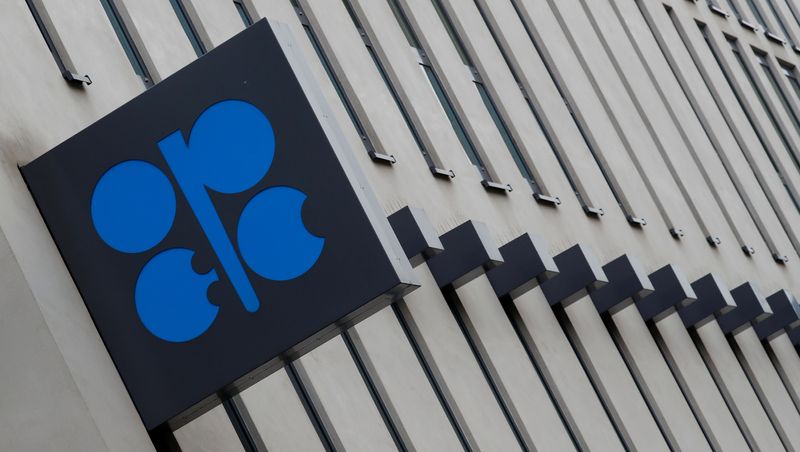By Olesya Astakhova and Ahmad Ghaddar
LONDON/MOSCOW (Reuters) - The oil market will have a small surplus of just 0.4 million bpd in 2022, much less than forecast earlier, according to OPEC+, due to underproduction of its members, OPEC+ sources said.
The report comes days ahead of an OPEC+ policy meeting on Sept. 5 and over a week after OPEC leader Saudi Arabia said the group may cut oil output.
The Joint Technical Committee (JTC), which met on Wednesday, advises the Organization of the Petroleum Exporting Countries and allies led by Russia, collectively known as the OPEC+ group of oil-producing nations, on market fundamentals.
Ahead of its Wednesday meeting, the JTC had issued a report, seen by Reuters, suggesting the oil market surplus would amount to 0.9 million barrels per day in a best-case scenario.
After the meeting the figure was put at 0.4 million bpd, two OPEC+ sources said as the group decided to include in balances significant underproduction numbers by its own members.
OPEC+ is ready to cut output amid volatility in the oil futures market, driven by thin liquidity and a disconnect with physical markets, Saudi Energy Minister Prince Abdulaziz bin Salman said last week.
Five sources told Reuters that discussions are yet to begin on production policy beyond September and whether the producer group would cut output.
Oil prices have been extremely volatile in recent weeks. While Prince Abdulaziz's comments helped propel prices to a one-month high above $105 a barrel on Monday, Brent crude on Wednesday traded $10 a barrel below those levels, on expectations for lower demand. [O/R]
At its last meeting, OPEC+ agreed to raise production targets by 100,000 bpd for September, having unwound record cuts of about 10 million bpd that it agreed in 2020 to help counter the impact of the pandemic.
The JTC report said oil demand - which it sees growing 3.1 million bpd this year - faces major uncertainties particularly from rising inflation and tightening monetary policy which are eating in to consumers' budgets.
"Rising energy prices pose another risk going forward," the report said. "The latter may lead to a more significant reduction in consumption than currently anticipated, especially towards the end of the year."

A Reuters monthly OPEC survey showed on Wednesday production rose in August to its highest level since the early days of the pandemic in 2020 but was still 1.4 million bpd below the August target, versus a 1.3 million bpd shortfall in July.
Many OPEC and OPEC+ producers are lacking the capacity to raise output due to insufficient oilfield investment as well as various Western sanctions in the case of Iran, Venezuela and Russia.